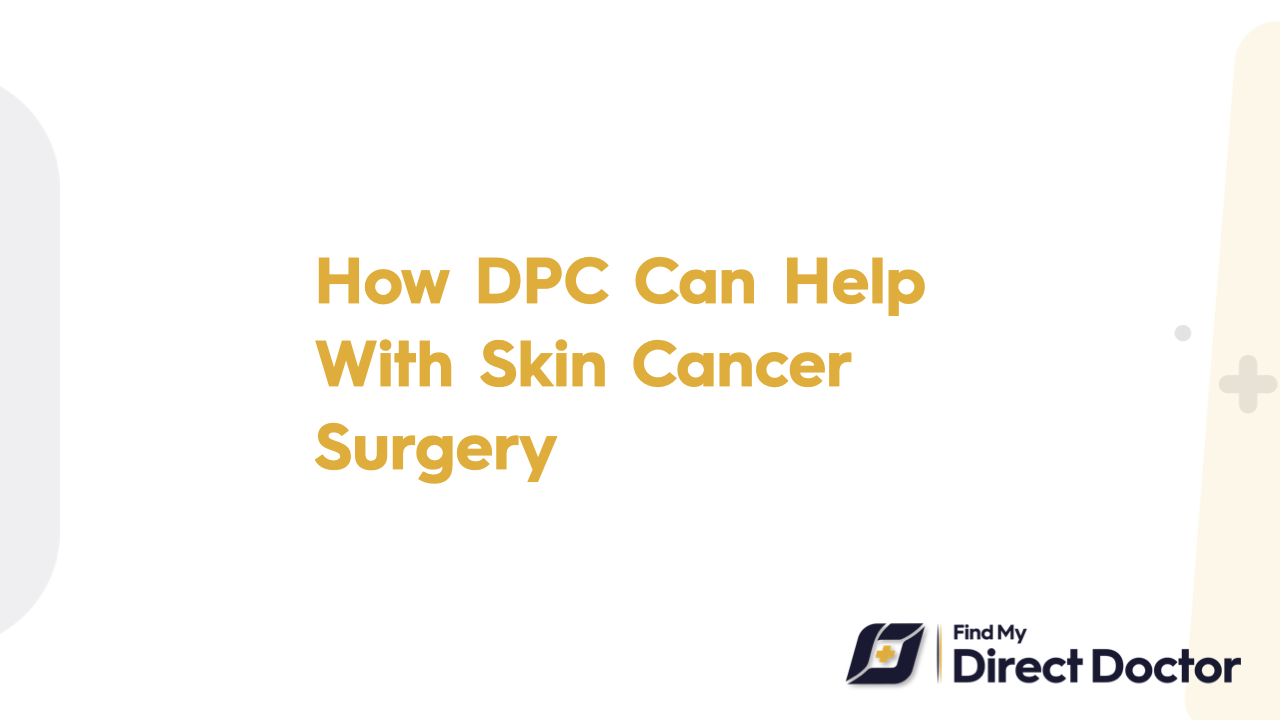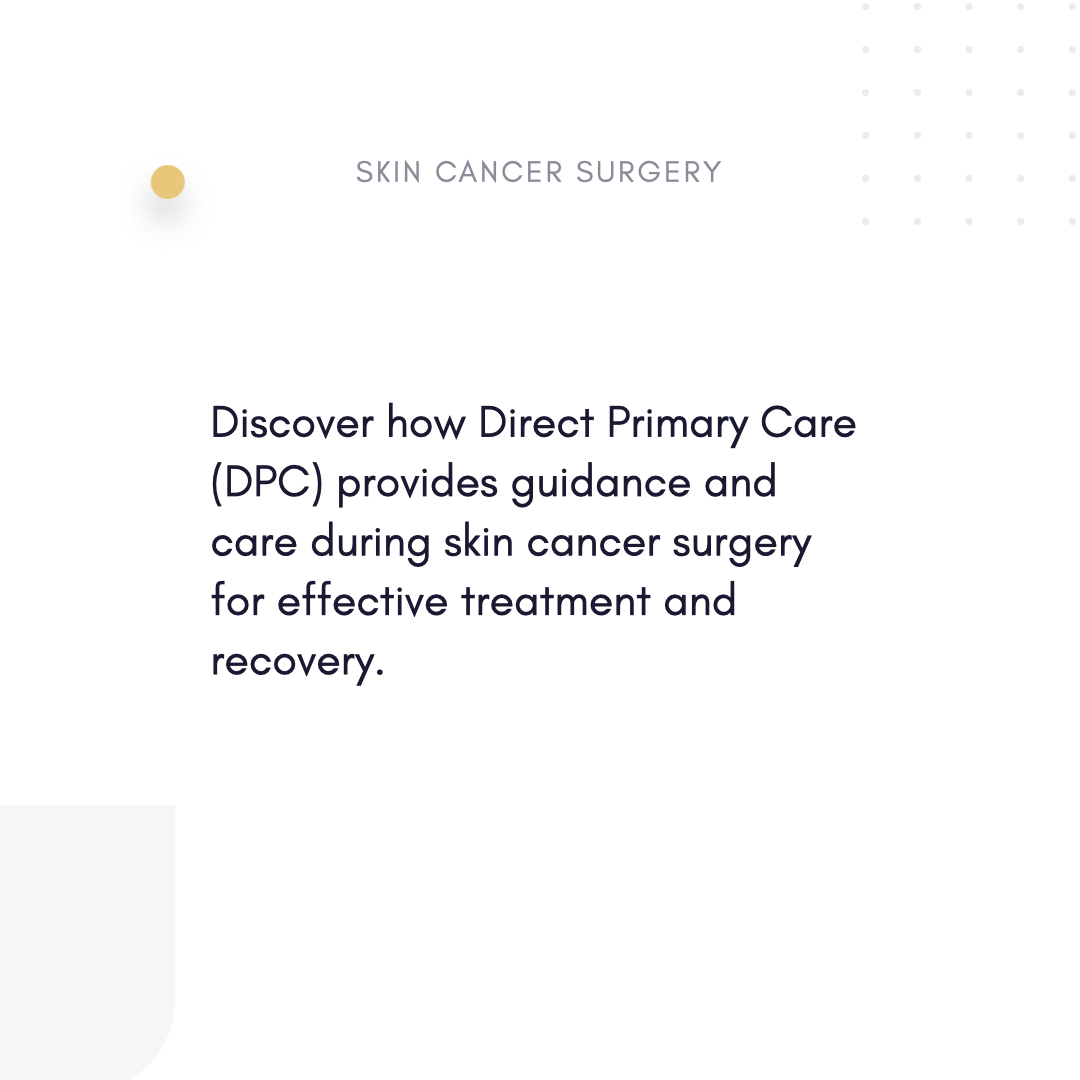Skin Cancer Surgery and Direct Primary Care (DPC): Precision, Prevention, Personalized Care
A mole or lesion that looks suspicious can be safely removed by skin cancer surgery. DPC makes sure that your procedure is planned, costs a lot, and is good for your skin health.

Getting Rid of Threats and Keeping Skin Safe: Understanding Skin Cancer Surgery
Surgery for skin cancer gets rid of cancerous growths by using methods like:
- Excision: Taking out the tumor and leaving extra space.
- Mohs surgery: taking off layers in high-risk areas like the ears and face.
- Curettage and electrodesiccation: scraping and burning basal and squamous cells.
Key facts:
- Safety: 95–99% of people with cancers in the early stages get better.
- Cost: DPC memberships (80–250 USD/month) include consultations and follow-ups, which is different from traditional fees (500–3,000 USD/procedure).
Waiting has risks, such as:
- Spreading cancer and losing your looks.
How DPC Makes Skin Cancer Surgery Work Better
Direct Primary Care (DPC) makes dermatologic care better by putting the patient first and making sure that everyone is on the same page.
Before Surgery in Detail Get ready
- Quick diagnostics: Make sure to schedule biopsies within 48 hours of finding a lesion.
- Finding places that are high-risk: Use dermoscopy to look at the skin around the area.
- Change the amount of blood thinners or immunosuppressants before the surgery.
Prices that are easy to understand and help all around
- Care that covers everything: As a member, you pay for referrals to surgeons, pathology fees, and wound care.
- Saving money: Self-pay DPC rates can help you save 30% to 50% on facility fees.
- Give out samples of SPF 50+ and guides on how to wear UV-protective clothing to teach people how to stay safe in the sun.
Getting Better and Staying Better That Works for You
- Get in: All day, every day: Take care of any redness, swelling, or drainage right away.
- Taking care of scars: After they heal, you could try silicone gels or laser treatments.
- Screening times: Patients at high risk should have full-body exams every six to twelve months.
Benefits of Direct Primary Care for People with Skin Cancer
- No time to wait: Most of the time, DPC patients have surgery within a week, which is much faster than the usual three or more weeks.
- Continuity: One group looks after wounds, checks for recurrence, and protects against the sun.
- No extra fees: Clear prices, like 1,200 USD for Mohs surgery with reconstruction.
Real-Life Stories of Success
- Case 1: Lisa, who is 45 years old, has basal cell carcinoma on her face. Lisa's DPC team did Mohs surgery on her eyelid, and there is very little scarring.
- Case 2: Tom, who is 60 years old, has melanoma in situ. Tom's DPC provider removed the lesion, and he has been cancer-free for five years thanks to regular screenings.
Questions and Answers: DPC Does Surgery for Skin Cancer.
- Q: How long will it take to feel better?
- A: Most excisions take 1 to 2 weeks, but Mohs may need to be done in stages.
- Q: Do I need surgery on my face?
- A: DPC works with reconstructive surgeons on more complicated cases.
- Q: Is it okay to take a shower after surgery?
- A: Yes, after 24 to 48 hours. DPC sells waterproof dressing kits.
- Q: What happens if cancer comes back?
- A: DPC plans to do screenings more often and look into extra treatments.
Why DPC Is the Best Place to Get Skin Care
Finding skin cancer early is very important, according to the American Academy of Dermatology (AAD). DPC gets things done by:
- Less time wasted: In the past, only 60% of biopsies were done on the first visit. Now, 95% are.
- More people are following through: 90% of DPC patients go to follow-up appointments, but only 70% of people in the U.S. do.
- Saving money: By getting all of their care in one place, members save between 1,000 USD and 5,000 USD a year.
Final Thoughts
When you have skin cancer surgery at DPC, it's not just about cutting out lesions. It's also about working with a team that will care about your skin health for the rest of your life. With DPC, you don't have to deal with getting a referral, you can see the best surgeons, and you can get a prevention plan that works for you. Get the best care for your skin, from biopsy to scar care.






